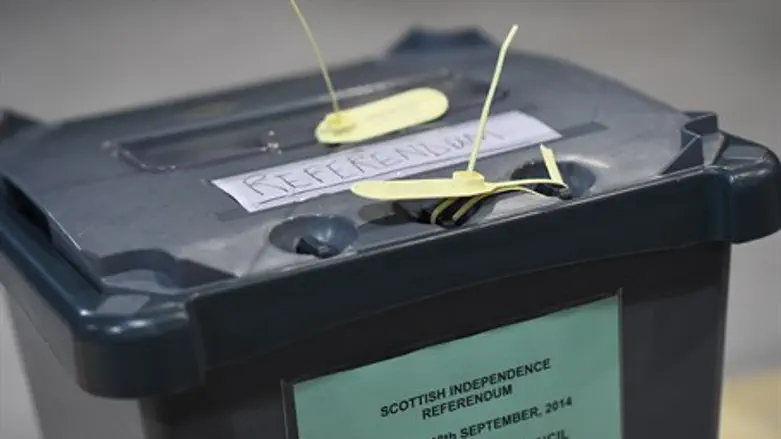
With Scotland's fateful independence referendum nearing a conclusion, BBC reports that the "No" campaign is well on its way to sealing the vote, leaving Scotland part of the UK.
So far 26 out of Scotland's 32 council areas have completed voting, with "No" garnering 54% and "Yes" just 46%. As of around 7:30 a.m. Israeli time, 1.4 million "No" votes had been counted as opposed to 1.17 million "Yes" votes - 1.85 million are needed to win.
BBC predicts that the "No" campaign will win by 55%, with "Yes" ending at 45%. Counting continues across the country.
The counting has finished in Glasgow, Scotland's largest province, where 53.49% majority voted "Yes" to independence.
Clackmannanshire was the earliest to declare, with "No" winning 19,036 votes and "Yes" on 16,350 on an 89% turnout, according to the report.
Voters in the Western Isles, Orkney and Shetland also voted against independence.
Counting will carry on through the night, with the final result expected after 06:30 BST Friday morning.
In Orkney, "No" won 10,004 votes compared with 4,883 for "Yes" while in Shetland voters rejected independence by 9,951 votes to 5,669.
In the Western Isles, the result was 10,544 to 9,195 in favor of Scotland staying in the UK.
Polling expert Professor John Curtice of Strathclyde University told the BBC that the Clackmannanshire result would be a "considerable disappointment" to the "Yes" side, who would have hoped to have done better in what is Scotland's smallest mainland local authority.
A YouGov on-the-day survey published shortly after polls closed suggested "No" was on 54% and "Yes" on 46%.
The survey questioned 1,828 people after they voted, together with the postal votes of 800 people, although it is not a traditional exit poll.
A "Yes" vote in the ballot would end the 307-year-old union between Scotland and the rest of the UK.
Members of Scotland’s Jewish community said earlier this week they felt far more anxious than most about the prospect of breaking away from the UK, due to fears that anti-Israel sentiment - which is more emphatic in Scottish politics than elsewhere in Britain- will take on a life of its own, to the detriment of Scottish Jews.
Over the 50-day war between Israel and Gazan terrorists anti-Semitism in Europe soared to record levels. In the UK, anti-Semitism quadrupled in the first half of 2014 compared with the same period in 2013 - largely due to an explosion in incidents over the summer months.
A World Zionist Organization study in August found that the number of anti-Semitic incidents in the world jumped 383% in July as compared to the same month the previous year, with Europe showing a 436% increase.
Scotland was effected by rising levels of anti-Semitism as well.